Search Results for 'Board of Works'
6 results found.
The late Sheila O’Donnellan believed that our literary heritage should be celebrated
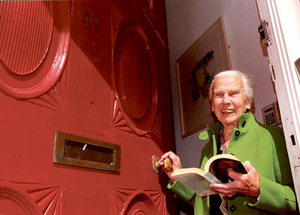
One of the great moments in the 20 year history of the annual Lady Gregory Autumn Gathering, was the arrival Lady Gregory’s two surviving grandchildren, Anne de Winton, and Catherine Kennedy. They drove up the avenue at speed, let their dog out for a run, and came over to the welcoming crowd grinning broadly.
The Galway jute factory
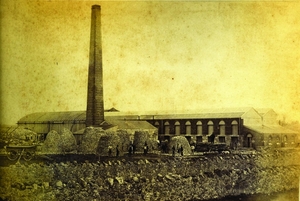
The Galway Vindicator and Connaught Advertiser of December 24 1851 carried an advertisement which read “TO BE LET, for such terms as may be agreed upon, and immediate possession given. EARL’S ISLAND MILL AND BLEACH GREEN. These well-known concerns occupied for so many years by the late Mr Mitchell, Linen Manufacturer, Miller, Bleacher, have always been esteemed to point of situation; preferable to every other site in Galway, but the improvement made by the Board of Works under the inspection of their skilful engineer SU Roberts ... have rendered it superior to any in the Kingdom. The land will be secured against being flooded for any part of the year. The Mill Race has been changed ... the Mill Power amended and is now equal to 40 horse power. The canal between Lough Corrib and the sea leaves the lake at the very point on which the Mill stands. The layby for boats is within 20 yards of it, and the spacious quay with landing crane and every accommodation for shipping goods will adjoin.”
McCormack welcomes weed control plans for local lakes
Councillor Eugene McCormack has welcomed the commitment by council management to implement the report in relation to the control of weed growth on Lough Lannagh and Billberry Lough. The commitment came following a motion tabled by Cllr McCormack at last Thursday’s Castlebar Town Council meeting requesting that the report be implemented.
Fear and loathing in east Galway
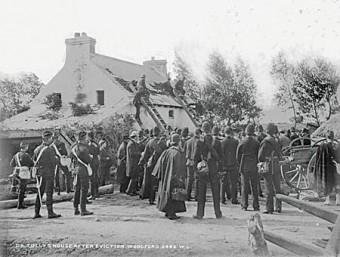
Following the extensive publicity and extraordinary use of more than 700 military, police, emergency men and bailiffs, to evict five families from the marquis of Clanricarde’s estate, the people of Woodford and all of east Galway were in a state of shock, anger and fear. It was now clear that Clanricarde would use every method within his considerable powers to evict any of his tenants who refused to pay their rent. Despite pleas for a rent reduction because of successive bad weather, he refused to even consider it. He scoffed at John Dillon’s Plan of Campaign, supported by the Land League, which urged tenants to stick together, and to refuse to pay unreasonable rent.
Attempts made in 1847 to establish fishing industry in the west
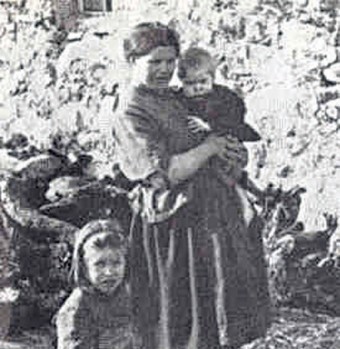
The tragedy of the Great Famine was compounded by the fact that our seas were full of fish, yet the lack of a sustainable fishing industry, and a general dislike of fish among the peasantry, left untouched this abundant food source. As the appalling statistics of hunger, riots, death, fever and evictions began to penetrate the British government, some action was at last taken*. Unsuitable as it was for Irish palates, vast quantities of American maize was imported, and distributed. Public relief schemes, such as canal-building and new roads were introduced to provide some employment, and efforts were made to establish a fishing industry.
Dredging the river
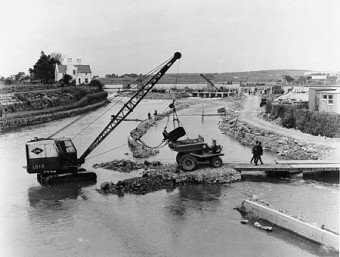
Alexander Nimmo made a survey of Lough Corrib almost 200 years ago in which he wrote the following: “The lake has 50 miles of shore, occupies 30,000 Irish acres and contains 1,000 acres of arable land in its isles, and contracts into a very spacious river about two and a half miles above Galway, which, flowing by the town, communicated with the Atlantic. The fall from the summit lake to the sea is considerable, but to the Wood Quay, above the town, it is trifling, and the river is in parts very shallow, running over a bed of rocks and hard gravel. It is not navigable from the sea to the Wood Quay, owing to the shallowness and rapidity of the water, and none but small boats can come down; but, unless in very dry seasons, it is thence navigable by boats drawing four feet of water and carrying from ten to twenty tons, with one square sail and four men, to Cong. They seldom sail unless before the wind, and though the lake has many islets and sunken rocks, the only serious difficulty in navigation is at Buachally Shoal about four miles up the lake, and at Newcastle. These shoals could be deepened for a small sum and the whole made to admit vessels of much greater magnitude. This fine navigation which extends about 30 miles, and into a seaport town, seems to deserve more attention than it has yet received. A good chart with soundings and sailing directions, should be published, the shoals or rocks cleared or beaconed, and a communication opened with the sea.”

